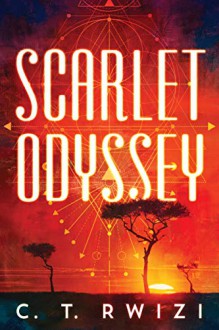
'Scarlet Odyssey', a debut novel by C. T. Rwizi, scheduled for publication on 1st July, is an epic fantasy that twists the classic quest trope into something new and exciting. C. T Rwizi, who comes from Zimbabwe originally is another exciting writer adding to the growing body of African Science Fiction (think 'Rosewater' and 'Binti').
'Scarlet Odyssey' is an epic fantasy with world-building on a huge scale, spectacular new magic systems, warlords who use black magic that feeds off human sacrifice and complex political and tribal systems that are under covert attack from external forces who are fomenting division and violence.
C. T. Rwizi manages to keep all this spinning and still have a story that is mostly character-driven and which is fast-paced enough that the 559 pages flew by and left me wanting more.
The plot folds five main storylines together, each focused on a character who have in common only that they face challenges that require them to reshape themselves, often in painful ways. The paths of these fives stories spiral in towards one another as the plot unfolds.
The dominant story is about Salo who comes from a tribe where men are fierce warriors and women become magic-wielding mystics. As a chief's son, he should be a warrior but he has failed to pass the necessary tests of courage. He is also secretly practising magic and, when the tribe is in danger, risks becoming an outcast by going through a ritual to become a mystic. Salo is then immediately sent on a quest to the Kingdom of the Yontai, the political centre of their region, that provides the frame for the rest of the novel.
Then we get the story of Ilapara, a young woman from Salo's tribe who has left their land to pursue a career as a mercenary in the neighbouring, warlord-ridden Umadiland. Being a mercenary is not what she hoped it might be and she sometimes finds herself doing things she does not think are right so when she meets Salo in Umadiland she accepts a post as his 'muscle' for the rest of his journey.
The third story tells of The Maidservant a powerful mystic who is a lieutenant (known as Disciples) to the most powerful Warlord in Umadiland and who pursues and attacks Silo on his quest. The Maidservant's story is told in the current timeline, intercut with scenes that show why and how she came into her power and the heavy price she paid for it.
In the Kingdom of the Yontai, we follow the story of Isa Andaiye Saire, a young princess in the ruling clan who is about to have her life torn apart and find herself with responsibilities that she has not been trained for.
The external attempt to destabilise the tribes is being driven by the fifth character, a mysterious woman known as The Enchantress. We only get parts of her backstory but her view on the world is very different from any of the other characters.
Although 'Scarlet Odyssey' takes place on an alien world with two suns and seems to be in the far future, it has a distinctly African feel to it that distinguishes it from all those kinda-sorta Medieval Europe only with magic fantasy books that I've seen so many of. It's not just that all the clothes and names and some of the tribal systems and symbols are African, it's in the mindset that accepts that pain is inevitable, that we all fail, and the world is often cruel and or indifferent. All of the characters in the five main storylines carry scars and all are trying to force transformations that are likely to require sacrifice.
At one point Salo and The Maidservant clash and in the process learn a great deal about one another. In a more Anglo book, one of them would be good and the other would be evil. In this book, they both discover that they have done terrible things in their past, unforgivable things, to get them the power they now have. I liked that, instead of discussing guilt, or shame or atonement, Salo says that the only freedom they have is to choose a different future.
I also liked what happened when Salo is confronted with the reality of slavery. Ilapara, who has grown used to having the stench of slavery in her nostrils, initially thinks Salo's response is dangerous, naive and ultimately futile. All of which is probably true. Yet Ilapara recognises that Salo has brought more change in a day than she has seen in years.
I don't know how many books there will be in this series but I hope they keep coming at a pace. By the end of the book, all five characters are in the Kingdom of the Yontai and the stage is set for major change. I'm engaged with the characters. I can't see a simple way forward. I know there are many things I don't yet understand about this world. So I need the next book as soon as possible, please.

 Log in with Facebook
Log in with Facebook 










